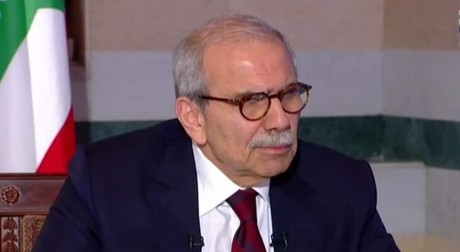Salam to Qassem: Hand over weapons to Lebanon, not to Israel

Prime Minister Nawaf Salam has noted that the paper presented to Lebanon by U.S. envoy Tom Barrack is for "the implementation of the cessation of hostilities arrangements and not a new agreement" as Hezbollah chief Sheikh Naim Qassem has suggested.
Responding to Qassem's remarks that Hezbollah will not "hand over its weapons to Israel," Salam said: "Who has called for handing over the arms to Israel? It not requires to hand over the weapons to Israel but rather to the Lebanese state, and the current (Israeli) attacks against these weapons are regrettable."
"We call for the monopolization of arms in the hand of the Lebanese state exclusively, not in the hand of Israel, the U.S. or the devils," Salam added.
"The majority of the Lebanese are very clear in demanding the monopolization of arms and the concentration of the war and peace decisions in the hands of the state exclusively," the premier said.
Admitting that the continued presence of arms in Hezbollah's hands is hindering the reconstruction process, Salam said there are fears of a possible Israeli escalation.
"But in return we have a chance to seriouslu work on implementing Resolution 1701 and engage positively with ideas presented by Barrack, because they would lead to a full Israeli withdrawal and a cessation of hostilities," Salam added.
"We have reservations over the paper and we're working on improving it and adding balance to some of its points," the PM said, reassuring that "no one will give up the Lebanese principles."
Acknowledging that "had it not been for the resistance's arms, the South would not have been liberated in 2000," Salam lamented that "afterwards we missed a major chance to monopolize arms and equip the Lebanese Army."
"And over the past two years, it turned out that arms have not deterred Israel, because it has done what it has done," Salam added.
So now is the time for Hezbullah adherents and others to do what they did not want to do before: call for the downfall of the Christian privilege (50% of parliamentary seats, per Article 24 of Lebanon's Constitution). Perhaps Hezbullah knew that if that set-aside was ended while Hezbullah functioned as the national army, Lebanese might properly fear a new dictatorship. Racism provides an unstable base for national development. One wonders if Israel's new "hegemonic ambition" expressed in attacks on Syria intended to prevent a consolidation of national power result from Israel's devotion to war: "when your only tool is a hammer, every problem looks like a nail."
Analysts say Israel’s attacks have “less to do with the minority Druze community and more with a strategic Israeli objective to create a new reality,” said Al Jazeera’s Nour Odeh.
“It’s part of Israel trying to show that it is the hegemonic power in the Middle East.”
Salam is right; the Iranian Adjunct Foreign Ministry official is wrong. Iran would do well to live by its words of its claim that it does meddle in the affairs of other nations. And all Lebanese will do well to adhere to the laws and authority of the elected government and not to be swayed by foreigners pursuing foreign adventures in Lebanon, interests and agenda that are foreign to the Lebanese state.
"Ignore that man behind the curtain ..." for he is a charlatan, a fake, and a coward whose words have been proven to be without merit or good intent.
No one ever demanded or even suggested that the Hizballah weapons be handed over to Israel. It was always intended that they would be handed over to LAF. So what is Qassem's problem?



